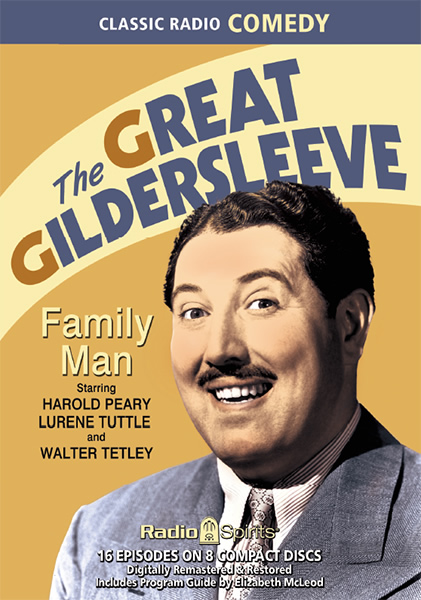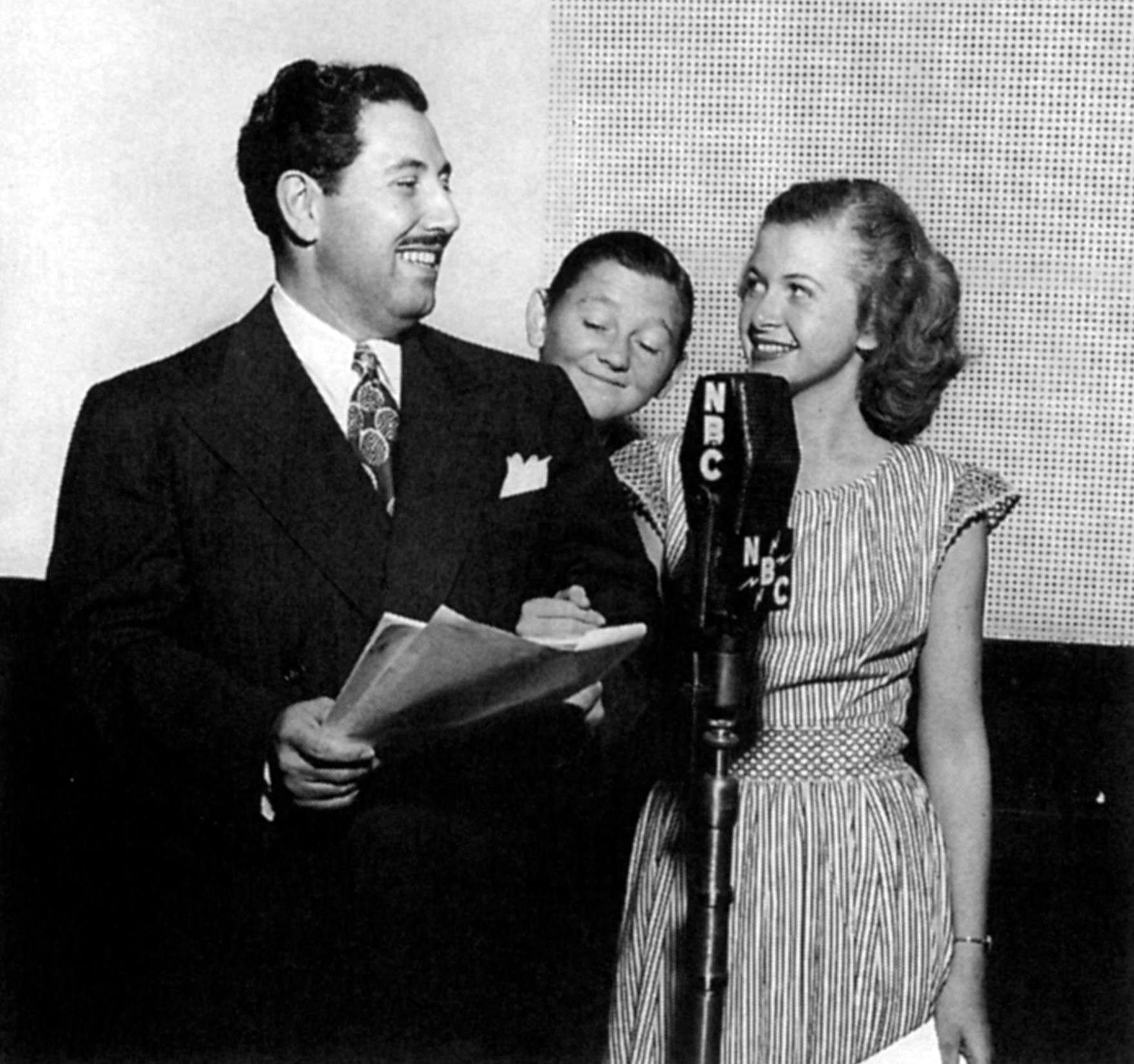“What a character!”
Posted by Ivan G. Shreve, Jr. on Aug 31st 2017
In addition to Jim and Marian Jordan’s star turns as Fibber McGee and Molly on The Johnson Wax Program in the 1930s, the couple was aided and abetted on the popular comedy show by a talented cast of supporting players. These included Hugh Studebaker (as handyman Silly Watson), Isabel Randolph (the snooty Abigail Uppington), Mel Blanc, Bea Benaderet…and especially Bill Thompson, who introduced favorites such as Nick Depopoulous and Horatio K. Boomer before moving on to Wallace Wimple and The Old Timer. Another talent on the program was actor-singer Harold Peary, who was a voice-of-all-trades before he persuaded the show’s writer, Don Quinn, to give him a meatier part. Quinn wrote Hal the role of Throckmorton P. Gildersleeve—Fibber’s nemesis and next-door neighbor, and the only individual pompous enough to challenge McGee’s windy tall tales.
After playing Gildersleeve on Fibber McGee and Molly for a couple of years, Peary wanted to move onto other pursuits…but NBC was anxious to retain his services due to the popularity of the Gildersleeve character. So, the network approached Hal with the idea for a spin-off: the show would be called The Great Gildersleeve and would move the supporting character from his Wistful Vista environs to the nearby town of Summerfield. There, he would act as executor to the estate of Marjorie and Leroy Forrester, his heretofore unmentioned niece and nephew. It was on this very date in 1941 that “Gildy” boarded the Summerfield Express, leaving his friends in Wistful Vista behind…and providing audiences (and later, fans of old-time radio) with an additional weekly half-hour of hilarity.

Harold Peary was very enthusiastic about The Great Gildersleeve; he loved to sing as well as act, and he felt that he’d have ample opportunity to do so on a show where he was the star. In a May 14, 1941 audition record, Gildy bids the employees of his girdle company fare-thee-well and shuffles off to Summerfield. The hope was that Gildersleeve would land the job as Fibber McGee and Molly’s summer replacement while they vacationed. Johnson’s Wax, Fib and Molly’s sponsor, sadly took a pass and went with another show (a Ransom Sherman comedy entitled Hap Hazard)—but the Kraft Foods Company liked what they heard, and agreed to foot the bills for The Great Gildersleeve’s eventual arrival on NBC’s schedule.
On The Great Gildersleeve, Gildy was put in charge of the estate of niece Marjorie and nephew Leroy…though Judge Horace Hooker had reservations about their uncle’s reliability. Hooker (Earle Ross) would be Gildy’s persistent nemesis throughout the show’s run, constantly involved in a running battle of wits and one-upmanship with “the Great Man” not unlike his old Wistful Vista neighbor Fibber McGee. Like Fibber McGee and Molly, Gildersleeve spotlighted a cast of supporting characters that Throckmorton encountered each week. For example, there was the neighborhood druggist J.W. Peavey (Richard LeGrand), whose catchphrase “Well, now…I wouldn’t say that” became one of the program’s most popular gags. Floyd Munson (Arthur Q. Bryan) was Summerfield’s sardonic barber, always offering Gildy advice regardless of whether it was wanted (or sound). Tom Gates (Ken Christy) was Summerfield’s police chief who, along with Gildy, Peavey, Floyd, and Judge Hooker, formed a fraternal organization known as “The Jolly Boys.” This quirky quintet would gather to sing and enjoy each other’s company.
On the Gildersleeve homefront, actress Lurene Tuttle portrayed Marjorie Forrester (the character went by “Eve” in the audition) for the show’s first three seasons. She handed the part off to Louise Erickson, who played Marjorie until the fall of 1948, when she relinquished the role to Mary Lee Robb. When the show premiered in 1941, Marjorie was actually a twenty-year-old with a strong romantic interest in the young attorney handling the Forresters’ estate. Somewhere along the way, Marj got hold of the same brew that kept Helen Trent thirty-five for so long…because the mid-1940s found her a few years younger and back in high school. Marjorie would eventually mature a second time and marry high school sweetheart Bronco Thompson (Richard Crenna), eventually giving birth to a pair of twins in later seasons of Gildersleeve. Her brother Leroy (played by Walter Tetley) also aged a little slower than most, but for most of the show’s run delighted in making mischief and deflating his “Unk’s” enormous ego whenever possible. Helping Gildy out with the house and the children was housekeeper Birdie Lee Coggins (Lillian Randolph), an exemplary cook who had been taking care of Marjorie and Leroy long before Gildy even thought about relocating to Summerfield. Birdie was delightfully outgoing, with a laugh that could rattle the rafters.

There were noticeable differences between the Throckmorton P. Gildersleeve that listeners came to know and love in Wistful Vista and the one who put down stakes in Summerfield. On Fibber McGee and Molly, there was at least one reference to a Mrs. Gildersleeve…but by the time Gildy arrived in Summerfield, he had apparently become a bachelor. (Old-time radio fans occasionally joke that somewhere at 83 Wistful Vista, there’s a body buried in the basement.) Gildy played the field on his own program, dating any number of equally single women—the most famous being Leila Ransom, a flirty Southern belle memorably portrayed by Shirley Mitchell. (In later seasons, Leila acquired a rival for Gildy’s affections in her cousin Adeline Fairchild—played by character veteran Una Merkel.) Leila almost got manacled to Gildy in the 1942-43 season, but he managed to dodge that bullet. He later dated school principal Eve Goodwin (Bea Benaderet), nurse Katherine Milford (Cathy Lewis), Ellen (Bullard) Knickerbocker (Martha Scott), and Paula (Bullard) Winthrop (Jeanne Bates), among others. Making Gildersleeve single was a smart move by the show’s writers, allowing them ample material for comedic plots…particularly when Gildy had to compete with stuck-up Runsom Bullard (Gale Gordon) in romantic rivalry. (Note that two of Gildersleeve’s “steadies” were related to Runsom…much to his dismay.)
But the big night-and-day difference between Fibber McGee and Molly and the spin-off was the tone of the two programs. Fibber was verbal slapstick, getting king-size laughs via a vaudeville sensibility in which each broadcast’s “plot” was a loose peg on which to hang hilarious gags. The Great Gildersleeve took a character-based approach to its comedy; we laughed at the broadcasts not because of the strength of the jokes, but because its characters were so vividly drawn and portrayed by a masterful cast. As Radio Spirits’ own Elizabeth McLeod once wrote: “Contrasted with Fibber’s cartoony approach, Gildersleeve was a show firmly grounded in the Real World. Its characters were far more textured than Fibber’s supporting cast, and thus far more realistic.” Elizabeth rightly characterized Gildersleeve as “the One Man’s Family of situation comedy.”
As one of radio’s finest sitcoms, The Great Gildersleeve had a longer shelf life than the Kraft products it so eagerly promoted. Even when Willard Waterman took over for Hal Peary in the fall of 1950 (Peary had moved to CBS with the Gildersleeve-like Honest Harold), Gildersleeve managed to stick around as radio began its death march, only departing the airwaves on March 21, 1957. The show remains a solid favorite with radio listeners of old and new generations, and the decision at the time of the show’s run to utilize a semi-serialized storyline each season is an immeasurable help when you consider that some of the series’ broadcasts have been lost to the ravages of time and neglect…and yet the show is easy to follow despite the missing installments.

Throckmorton P. Gildersleeve might be having “one of his bad days” …but here at Radio Spirits, every day with Summerfield’s water commissioner is like an idyllic afternoon spent at Grass Lake. Our newest Gildersleeve compendium, Family Man, features sixteen vintage broadcasts from the program’s inaugural season (1941-42), while For Corn’s Sake (liner notes by yours truly!) focuses on later shows with Willard Waterman in the Gildersleeve role. You’ll find a hilarious June 14, 1942 broadcast on our potpourri collection Great Radio Comedy, and for my money—some of the all-time memorable Gildersleeve shows were the heartwarming broadcasts heard around the holidays; there’s Yuletide Throcky on Christmas Radio Classics, The Voices of Christmas Past, and Radio’s Christmas Celebrations. Happy anniversary, Gildy!

